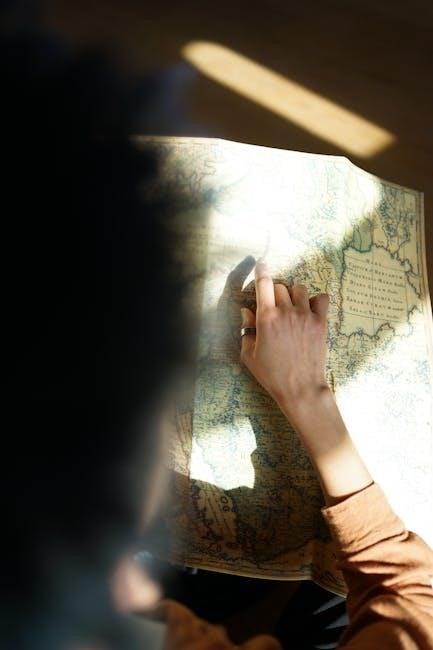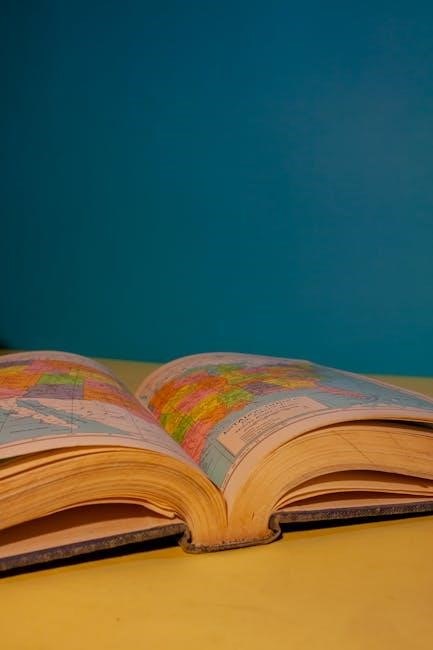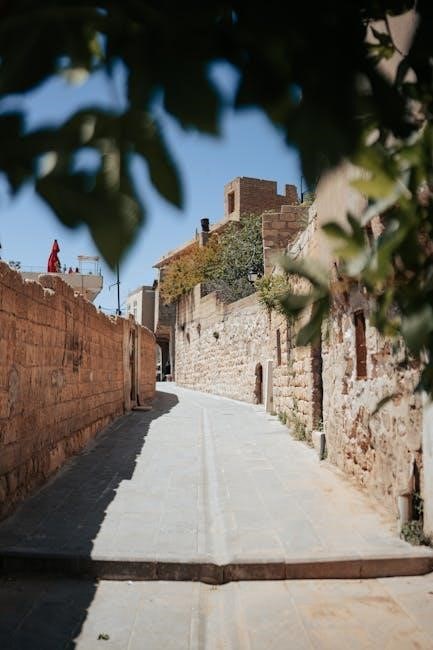world history study guide
Category : Guide
World history explores the interconnected narratives of human societies‚ linking past to present across diverse cultures and regions. It fosters empathy and global understanding‚ emphasizing shared experiences and unique perspectives that shape our collective identity. By studying world history‚ learners gain insights into cultural‚ political‚ and social transformations that have influenced contemporary global dynamics. This field encourages critical thinking‚ analysis‚ and appreciation of humanity’s complex journey over time.

1.1 What is World History?
World History is the study of humanity’s past on a global scale‚ examining diverse societies‚ cultures‚ and events across time. It involves critical thinking and analysis to understand the complexities of the modern world by exploring how past interactions have shaped present realities. This field emphasizes the interconnectedness of regions and civilizations‚ offering insights into recurring themes such as cultural exchange‚ conflict‚ and technological advancement. By studying World History‚ we gain a deeper understanding of the forces that have shaped human experiences and continue to influence contemporary global dynamics.
1.2 Importance of Studying World History
Studying World History is essential for understanding global dynamics‚ fostering empathy‚ and developing critical thinking skills. It provides insights into how past events shaped the present and inform the future. By examining diverse cultures‚ societies‚ and civilizations‚ learners gain a broader perspective on human experiences‚ enabling them to appreciate the interconnectedness of the world. This knowledge helps individuals navigate complex global issues‚ promoting informed decision-making and cultural understanding in an increasingly interconnected world.
1.3 Key Themes in World History
Key themes in World History include cultural exchange‚ technological progress‚ migration‚ and the rise and fall of civilizations. Themes like imperialism‚ environmental interactions‚ and the impact of religions are also central. These themes highlight human adaptability‚ conflict‚ and cooperation over time. Understanding these patterns helps learners identify recurring challenges and opportunities‚ providing a framework to analyze historical events and their relevance to contemporary global issues.

Ancient Civilizations
Exploring ancient civilizations reveals human culture’s origins‚ highlighting technological‚ governance‚ and cultural advancements that shaped modern society. Key developments include agriculture‚ writing‚ and trade‚ which laid the groundwork for progress.
2.1 Mesopotamia: The Cradle of Civilization
Mesopotamia‚ situated between the Tigris and Euphrates rivers‚ is renowned as the cradle of civilization. It pioneered writing (cuneiform)‚ governance (city-states like Ur and Babylon)‚ and law (Code of Hammurabi). Agriculture thrived via irrigation‚ enabling urbanization and trade. Cultural advancements included mathematics‚ astronomy‚ and literature‚ such as the Epic of Gilgamesh. Mesopotamia’s innovations laid the foundation for future civilizations‚ showcasing humanity’s early achievements in organization‚ creativity‚ and progress. Its legacy remains a cornerstone of world history.
2.2 Ancient Egypt: Pyramids and Pharaohs
Ancient Egypt‚ thriving along the Nile River‚ is celebrated for its monumental pyramids‚ which served as tombs for pharaohs. The Great Pyramid of Giza and the Sphinx exemplify their architectural prowess. Egyptian society developed hieroglyphic writing‚ a decimal-based numerical system‚ and advanced medical practices. Their polytheistic religion emphasized an afterlife‚ reflected in elaborate burial practices like mummification. Egypt’s legacy includes contributions to astronomy‚ mathematics‚ and art‚ leaving a lasting impact on human civilization and culture.
2.3 The Indus Valley Civilization
The Indus Valley Civilization‚ flourishing around 2600–1900 BCE‚ was one of the world’s earliest urban cultures‚ centered in present-day Pakistan and northwest India. Known for advanced city planning‚ it featured well-organized drainage systems and grid layouts in cities like Harappa and Mohenjo-Daro. Trade networks extended across Mesopotamia and beyond‚ with artifacts like seals and pottery showcasing artistic and cultural sophistication. This civilization’s contributions to early urban development and technological advancements remain significant in world history‚ highlighting human ingenuity and societal complexity.
2.4 Ancient China: Qin‚ Han‚ and the Great Wall
Ancient China’s Qin Dynasty (221–206 BCE) unified various warring states‚ establishing a centralized bureaucracy and standardizing weights‚ measures‚ and writing. The Han Dynasty (206 BCE–220 CE) expanded China’s borders through the Silk Road‚ fostering trade and cultural exchange. Both dynasties laid foundations for China’s imperial system and Confucian ideals. The Great Wall‚ initially constructed during the Qin Dynasty‚ symbolized defensive strategies and engineering prowess‚ becoming an iconic representation of China’s historical grandeur and enduring legacy in world civilization.
2.5 Mesoamerican Civilizations: Aztecs and Mayans
The Aztecs and Mayans were advanced Mesoamerican civilizations known for their sophisticated knowledge of astronomy‚ mathematics‚ and architecture. The Aztecs built the capital Tenochtitlán‚ a center of politics and religion‚ while the Mayans developed a complex writing system and calendar. Both civilizations emphasized agriculture‚ trade‚ and ritual sacrifices. Their legacies include monumental structures like Chichen Itza and Tikal‚ showcasing their cultural and scientific achievements. Their declines were influenced by environmental strain‚ internal conflicts‚ and eventual external conquests‚ leaving a rich cultural heritage in Mesoamerica.
2.6 Ancient Greece: Philosophy and Democracy
Ancient Greece is renowned for its profound contributions to philosophy and democracy. Philosophers like Socrates‚ Plato‚ and Aristotle laid the groundwork for Western thought‚ exploring ethics‚ logic‚ and the nature of reality. Democracy emerged in Athens‚ with citizens participating in decision-making‚ setting a precedent for modern governance. Greek culture also flourished in theater‚ art‚ and architecture‚ producing iconic works that continue to inspire. These advancements not only shaped Greek society but also left a lasting legacy in global intellectual and political development.
2.7 Ancient Rome: Republic and Empire
Ancient Rome transitioned from a republic to a vast empire‚ leaving a lasting impact on law‚ governance‚ and culture. The Roman Republic‚ established after the expulsion of kings‚ was governed by elected officials and a system of checks and balances. Rome’s expansion across Europe‚ North Africa‚ and the Mediterranean spread Latin‚ law‚ and infrastructure. The Twelve Tables codified Roman law‚ while achievements like aqueducts and roads showcased engineering prowess. The empire‚ established by Augustus‚ centralized power‚ fostering stability but also leading to eventual decline. Rome’s legacy endures in modern legal systems‚ languages‚ and governance structures.
2.8 Early Empires and Their Legacies
Early empires‚ such as Mesopotamia‚ China‚ and the Inca‚ laid the groundwork for modern governance and culture. They developed centralized administrative systems‚ legal codes‚ and infrastructure like roads and irrigation. These empires facilitated trade and cultural exchange‚ spreading ideas and technologies. Their legacies include the concept of citizenship‚ written records‚ and architectural innovations. The study of early empires reveals how they shaped political‚ social‚ and economic systems‚ leaving lasting impacts on global development and cultural identity.

The Medieval Period
The Medieval Period‚ spanning the 5th to 15th century‚ saw the rise of feudalism‚ the influence of the Catholic Church‚ and the impact of the Crusades and Black Death. It was marked by cultural and political shifts‚ shaping Europe’s identity and laying the groundwork for future societal transformations through its enduring legacies.
3.1 The Fall of the Roman Empire
The fall of the Roman Empire marked a pivotal turning point in world history. Internally‚ corruption‚ economic decline‚ and political instability weakened the empire. Externally‚ constant invasions by barbarian tribes strained resources. The sacking of Rome by the Visigoths in 410 CE and the Western Empire’s collapse in 476 CE symbolized its end. This event ushered in the Middle Ages‚ reshaping Europe’s political and cultural landscape and influencing future civilizations through its legacy of law‚ governance‚ and culture.
3.2 The Byzantine Empire
The Byzantine Empire‚ also known as the Eastern Roman Empire‚ survived the fall of the Western Empire and thrived for over a thousand years. Centered in Constantinople‚ it preserved Roman law‚ culture‚ and religion while blending Greek and Christian influences. The empire was a hub of trade‚ art‚ and intellectual achievements‚ particularly during the reign of Justinian I‚ who oversaw the codification of Roman law. Its strategic location bridged Europe and Asia‚ fostering cultural exchange. The empire’s legacy endured long after its eventual fall in 1453 CE.
3.3 The Rise of Islam and the Islamic Golden Age
The rise of Islam began in the 7th century with the Prophet Muhammad‚ uniting Arab tribes under a shared faith and creating a vast empire. The Islamic Golden Age (8th–14th centuries) saw advancements in science‚ mathematics‚ medicine‚ and philosophy‚ with scholars like Al-Khwarizmi and Ibn Sina making groundbreaking contributions. This period also preserved and transmitted classical knowledge‚ influencing later European Renaissance. The Islamic empire’s expansion through trade and conquest spread its cultural and religious legacy‚ shaping global history and fostering cross-cultural exchange.
3.4 Feudalism in Europe

Feudalism emerged in Europe as a decentralized political and social system following the fall of the Roman Empire. It was characterized by a hierarchy of obligations between lords‚ vassals‚ and serfs. Lords provided land and protection‚ while vassals offered military service and loyalty. Serfs worked the land‚ forming the base of the feudal economy. This system shaped medieval Europe’s social structure‚ economy‚ and governance‚ fostering localized power and a rigid class system that persisted for centuries‚ influencing later political and cultural developments.
3.5 The Crusades and Their Impact
The Crusades‚ beginning in 1096‚ were a series of religious wars initiated by European Christians to reclaim the Holy Land from Muslim rule. They profoundly shaped medieval politics‚ religion‚ and culture. The Crusades fostered both conflict and cultural exchange‚ influencing trade‚ art‚ and intellectual movements between East and West. While they failed to achieve lasting religious dominance‚ their legacy includes heightened religious tensions and a complex interplay of cooperation and hostility that resonated across centuries‚ shaping global dynamics and cultural identities.
3.6 The Black Death and Its Consequences
The Black Death‚ a pandemic that swept through Europe in the 14th century‚ caused unprecedented demographic‚ social‚ and economic changes. It led to a significant reduction in the workforce‚ disrupting feudal systems and fostering the rise of wage labor. The aftermath saw increased social mobility and shifts in power dynamics between lords and peasants. Culturally‚ it influenced art and literature‚ reflecting the trauma and introspection of the time. The Black Death remains a pivotal event in world history‚ shaping medieval and early modern societies profoundly.
3.7 Medieval Trade and Cultural Exchange
Medieval trade and cultural exchange flourished through networks like the Silk Road and Mediterranean routes‚ facilitating the exchange of goods‚ ideas‚ and innovations. Spices‚ textiles‚ and precious metals were traded extensively‚ while religious and philosophical ideas spread across regions. This exchange fostered cross-cultural understanding and influenced art‚ architecture‚ and science. The growth of cities and merchant classes emerged‚ laying the groundwork for economic systems like banking and credit. These interactions connected diverse civilizations‚ shaping the global cultural and economic landscape.

The Early Modern Period
The Early Modern Period saw transformative movements like the Renaissance‚ exploration‚ Reformation‚ and Enlightenment‚ reshaping culture‚ religion‚ and politics globally and laying the groundwork for modern society.
4.1 The Renaissance and Its Cultural Impact
The Renaissance‚ spanning the 14th to 17th centuries‚ was a cultural and intellectual transformation that originated in Italy. It revived classical knowledge‚ inspiring advancements in art‚ science‚ and literature. Figures like Leonardo da Vinci and Michelangelo epitomized this era of innovation. The printing press disseminated ideas widely‚ fostering education and critical thinking. This period bridged the medieval and modern worlds‚ leaving a lasting legacy in art‚ philosophy‚ and intellectual inquiry‚ shaping the foundation of contemporary culture and thought.
4.2 The Age of Exploration and Colonization
The Age of Exploration (15th–17th centuries) was a period of maritime discovery led by European nations like Portugal and Spain. Driven by the quest for trade routes‚ wealth‚ and territorial expansion‚ explorers such as Columbus and Vasco da Gama established new connections between Europe‚ the Americas‚ Africa‚ and Asia. This era reshaped global politics‚ economies‚ and cultures‚ fostering colonization and the exchange of goods‚ ideas‚ and populations. It laid the foundation for modern globalization but also brought significant challenges and transformations to indigenous societies worldwide.
4.3 The Protestant Reformation
The Protestant Reformation was a 16th-century religious and social movement that challenged the authority of the Catholic Church. Led by figures like Martin Luther and John Calvin‚ it sought to reform Church practices and doctrines‚ sparking widespread theological debates. The Reformation emphasized individual faith‚ scripture‚ and the priesthood of all believers‚ leading to the emergence of Protestant churches. This movement profoundly influenced European society‚ politics‚ and culture‚ shaping modern religious and intellectual traditions while fostering division within Christianity.
4.4 The Enlightenment and Its Ideas
The Enlightenment‚ an 18th-century intellectual movement‚ emphasized reason‚ individualism‚ and scientific inquiry. Thinkers like Voltaire‚ Rousseau‚ and Locke advocated for rational thought‚ challenging traditional authority and fostering progress. Their ideas promoted freedom‚ tolerance‚ and the separation of church and state‚ shaping modern political and philosophical discourse.
The movement inspired democratic revolutions and reforms‚ influencing the American and French Revolutions. It also advanced scientific discoveries and cultural shifts‚ laying the groundwork for modern democracy and human rights‚ while encouraging education and critical thinking across society.

The Modern Period
The Modern Period‚ spanning the 18th to 20th centuries‚ saw transformative events like industrialization‚ World Wars‚ and decolonization‚ reshaping global politics‚ economies‚ and societies profoundly.
5.1 The Industrial Revolution
The Industrial Revolution‚ beginning in 18th-century Britain‚ transformed societies by shifting from manual production to machines and factories. Steam engines and textile innovations drove economic growth‚ urbanization‚ and technological advancement. It reshaped labor systems‚ creating new social classes and challenges like poor working conditions. The revolution spread globally‚ influencing trade‚ transportation‚ and daily life‚ laying the foundation for modern industrialized societies and their inherent opportunities and inequalities.
5.2 Nationalism and the Unification of Nations
Nationalism emerged as a powerful force in the 19th century‚ driving the unification of nations and shaping modern statehood. In Europe‚ movements like Italian unification‚ led by Cavour and Garibaldi‚ and German unification under Bismarck‚ created cohesive nation-states. Nationalist ideologies emphasized shared identity‚ culture‚ and sovereignty‚ often leading to conflicts over territorial claims. This period also saw the rise of national consciousness in regions like the Balkans and Asia‚ influencing global politics and the formation of independent states‚ with lasting impacts on international relations and cultural identity.
5.3 World War I and Its Aftermath
World War I (1914–1918) was a global conflict sparked by imperialism‚ nationalism‚ and militarism‚ with complex alliances exacerbating tensions. The war introduced trench warfare and new technologies‚ causing unprecedented casualties. The Treaty of Versailles ended the war but imposed harsh penalties on Germany‚ fueling resentment and economic instability. Its aftermath saw the Russian Revolution‚ collapse of empires‚ and rise of fascism‚ setting the stage for World War II. The war reshaped global power structures and left lasting scars on society and international relations.
5.4 The Great Depression and World War II
The Great Depression‚ beginning in 1929‚ was a global economic collapse marked by widespread unemployment and financial ruin. It exacerbated political instability‚ contributing to the rise of fascist regimes. World War II (1939–1945) became the deadliest conflict in history‚ involving major powers and ending with the atomic bombings of Hiroshima and Nagasaki. The war’s aftermath saw the emergence of the United States and Soviet Union as superpowers‚ setting the stage for the Cold War and reshaping the global political landscape.
5.5 The Cold War and Its Global Impact
The Cold War (1947–1991) was a geopolitical tensions between the United States and the Soviet Union‚ marked by proxy wars‚ espionage‚ and an arms race. It shaped global alliances‚ sparking conflicts like the Korean and Vietnam Wars. The era saw the rise of nuclear deterrence and ideological battles between capitalism and communism. The fall of the Berlin Wall in 1989 and the Soviet Union’s dissolution in 1991 marked its end‚ reshaping global politics‚ economies‚ and cultural landscapes forever.

The Contemporary Period
The contemporary period‚ spanning late 20th century to present‚ is marked by rapid technological advancements‚ globalization‚ and shifting political landscapes. It emphasizes interconnectedness and addressing global challenges.
6.1 Globalization and Its Effects
Globalization has profoundly shaped the modern world‚ fostering economic interdependence and cultural exchange. It has led to the rise of multinational corporations‚ international trade‚ and technological advancements. However‚ critics argue it has also exacerbated inequality‚ cultural homogenization‚ and environmental challenges. The digital age has accelerated these processes‚ creating both opportunities and complexities. Understanding globalization’s multifaceted impact is crucial for grasping contemporary societal transformations and their historical roots.

6.2 The Digital Age and Its Transformations
The Digital Age has revolutionized human society‚ transforming communication‚ education‚ and commerce. The rise of the internet‚ social media‚ and digital tools has enabled unprecedented global connectivity. This era has democratized access to information‚ fostering innovation and collaboration. However‚ it has also raised concerns about privacy‚ misinformation‚ and digital divides. The Digital Age continues to reshape industries‚ cultures‚ and personal lives‚ creating both opportunities and challenges that define the 21st century’s evolving landscape.

Study Tips and Resources
Effective study methods include brainstorming‚ using Google tips‚ and consulting primary sources. Utilize online databases and study guides for comprehensive learning. Stay organized and critical;
7.1 Effective Study Methods for World History
To master world history‚ adopt structured study methods. Start by brainstorming key themes and events‚ then organize them chronologically or thematically. Use timelines and concept maps to visualize connections between civilizations. Flashcards can help memorize dates‚ terms‚ and cultural practices. Engage with primary sources like texts‚ images‚ and artifacts to gain deeper insights. Regularly review and summarize notes‚ focusing on broader patterns rather than isolated facts. Leverage online databases and historical guides to supplement your learning‚ ensuring a well-rounded understanding of global developments.
7;2 Recommended Books and Online Resources
Enhance your world history studies with essential books and online tools. Key texts include A History of the World in 100 Objects by Neil MacGregor and The Silk Roads by Peter Frankopan. Online platforms like BBC History‚ Khan Academy‚ and JSTOR offer scholarly articles and interactive content. Utilize digital archives such as the Library of Congress and UNESCO’s World Heritage Collection for primary sources. These resources provide comprehensive insights‚ helping you explore diverse cultures and historical events effectively.
